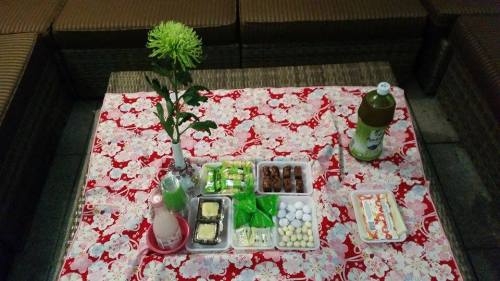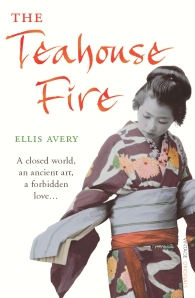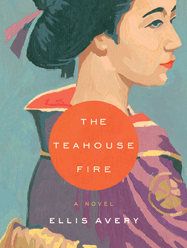
Poor Raj! He set such a beautiful table, and no one came for the book club. Aaron had emailed Raj a list of questions beforehand to moderate the discussion, but since no one came, Raj decided to answer them.
Questions for Teahouse Fire:
- On p. 284, there is a Japanese phrase “ichigo ichie” for the tea world. It means “one moment, one meeting,” or in the deepest sense, it means there are no mistakes in life. What does this phrase mean about life in general? Does the novel embody this phrase? Which character, do you think, apply this philosophy?
 Ichi-go ichi-e is linked with Zen Buddhism and concepts of transience, particularly depicted during the tea ceremony conducted in the style of famed tea master Sen no Rikyu where unique scrolls, tea bowls and flowers are set up in the tea room. In the context of tea ceremony, ichi-go ichi-e reminds participants that each tea meeting is unique. This is also true that there is has been no repetition of the set up for the varios tea ceremonies in the book. In each of the tea ceremony, the host and guest had one unique experience that lead to friendship or disaster
Ichi-go ichi-e is linked with Zen Buddhism and concepts of transience, particularly depicted during the tea ceremony conducted in the style of famed tea master Sen no Rikyu where unique scrolls, tea bowls and flowers are set up in the tea room. In the context of tea ceremony, ichi-go ichi-e reminds participants that each tea meeting is unique. This is also true that there is has been no repetition of the set up for the varios tea ceremonies in the book. In each of the tea ceremony, the host and guest had one unique experience that lead to friendship or disaster
In a deeper sense, it is about Aurelia meeting Yukako in the teahouse that night of the fire – it is that one moment, one meeting that changed the courses of their lives. Towards the end, in the same tearoom, Aurelia kissed Yukako and again changed the course of their lives.
- What are the similarities and differences between Western and Japanese cultures in the book?
Similarities:
Mary vs Goddess of Mercy.
The status of fallen women is the same – Aurelia’s mom and Kenji’s girlfriend Aki – outcast.
Differences:
Bath rituals
Role of wife
Social order – Samurai, Traders and the untouchable working class
- Is Urako/Aurelia responsible for her uncle’s death? (Also note the molestation scene before the fire.)
She prayed for her life to change and she rather not have the uncle with her – shown by her praying to change her life before the goddess and also her uncle only showed up in nightmares later in her life as Urako. Also, she never bothered to find if her uncle survived the fire at all.
- Why does Urako/Aurelia have made up last names?
I believe that she doesn’t know her father’s name and that name “Bernard” was given by her uncle. Hints that her mom could have been raped by a priest was suggested by both Aurelia and her mom when she said, “Aurelia Bernard. Who is this Bernard, tell me? The Church hates truth, and the nuns hate it most of all.”
- Why does Urako have sex with Nao?
She wanted someone who desire Yukako to desire her as well. Also she believes Yukako desires Nao instead of her and she wants to punish her.
- Objects in the book often have significant meanings: the lightning cup, Yukako making a spoon out of Baishian’s wood for Urako, and Urako’s Catholic medal. What gives these things meaning? And what is the significance of these things? On a side note, does Yukako’s marketing on tea ware cheapen or ennoble the art?
Symbolism and subtle messages are very much a cultured Japanese behaviour – the book is full of hidden messages just like Urako’s closeted sexuality – classic example of her dress handing in the alcove.
Yukako’s marketing of the tea sets made them more of a commercial item rather than “ichigo ichie”- “one moment, one meeting”.
- Why does Yukako set Baishian on fire? What is the significance of fire and water in the book?
Yukako’s way of atoning for her mistake – she will never be able to host another tea ceremony in Baishian again – again on the theme of Ichigo Ichie.
You need fire and water to make tea – its sweet irony. Also Aurelia had a fire after a long journey over sea into Japan and after another fire she sails away from Japan.
- Yukaka appears to be half sister to Koito. Does it give her a right to teach Koito, a geisha, chado?
Yukako did it for other reasons rather than the fact that she is a half sister. Yukako , according to the book, has been key reason for women to learn tea. She also introduced this to the Geisha world through Koito. But whether she has a right – it all depends on who’s perspective you want to look from.
- During one teaching lesson with Koito, Yukako honors Urako’s Western dress. Why?
Yukako’s acceptance of the western influence into their lives. Also Urako is her first student.

- Why does Aurelia’s mother insist on calling her blond when she has black hair?
Maybe her real father had blond hair??
- Comment on the throwaway reference to Singapore as a name for a ship. Is it exoticizing Singapore?
Author wants to show the historic importance of Singapore as a port as well of the fact that Japan owned Singapore at one time.
- Incest: Comment on the rampant incest that occurs in the novel: Aurelia with her uncle, Yukako with her half brother, Nao; Kenji (Yukako’s son) with Akio (Nao’s daughter).
Its common in those days – people don’t get out of their circle and houses too much
- Why does Akio dress Koito in Yukako’s kimino?
Fantasy – Fetish – every man wants a virtuous wife who is a whore in bed!
- Discuss the male-female relationships in the book. Are there any positive ones? (Also look at mother-son relationships).
Yukako – Tai – positive
Tai – Tsuko – positive
- Discuss the male-male relationship in the book, especially the triangle between Nao, Hiro, and Akio.
There is a lot of brotherly love and jealousy by Nao to Hiro and Akio. Hierarchy in the teahouse is one the reason for this and class status.
- Nao’s class struggle.
Didn’t help when he married an untouchable gal !!
- Love: Does Urako love Yukako or Inko?
Different sort of love – Yukako is a sort of motherly-sisterly love – whereas Inko was more of her equal. Inko loves Urako more that Urako loves her while Urako love Yukako more than Yukako love her.
- Discuss the female characters (Pipe Lady, Yukako, Urako, Chio, Aki, Koito, Inko)
Really? Why??? There is too many female characters in this book!!!!
- Discuss the male characters. Are there any strong and positive male characters? Is this another male-bashing lesbian novel? (Mountain, Akio, Jiro, Kenji, Tai.)
There was no real great male characters , but at the same time there is no real male bashing. There are more mean gals depicted in this book than lame men. This book centres on women rather than men.

